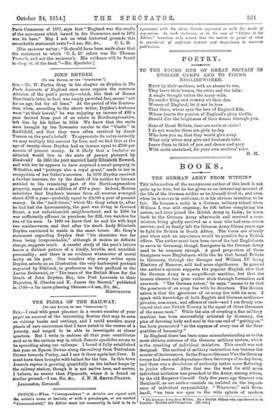JOHN DRYDEN.
[To THY EDITOR OF THB "SrEcrAvort."] SIR,—Mr. W. Forbes Gray in his chapter on Dryden in The Poets Laureate of England once more repeats the common delusion of the poet's poverty—which, like that of Emma Hamilton's (who, in fact, was amply provided for), seems "not for an age, but for all time." At the period of the Restora- tion, when, according to the above writer, Dryden's fortunes were "at their lowest," he was enjoying an income of £60 a year derived from part of an estate in Northamptonshire, left him by his father in 1654. We know that the rents were brought by the Towcester carrier to the "Castle" in Smithfield, and that they were often received by Jacob Tonson on the poet's behalf. To appreciate its value correctly we may multiply this amount by four, and we find that at the age of twenty-three Dryden had an income equal to £240 per annum of present money. Is it likely that a bachelor so situated would live in the state of penury pictured by Bbadwell P In 1663 the poet married Lady Elizabeth Howard, and with her he appears to have acquired a small property in Wiltshire, and "perhaps also a royal grant," made to her in recognition of her father's services. In 1670 Dryden received a further increase, for by the death of his mother he became entitled to the remaining part of the Northamptonshire property, equal to an addition of £80 a year. Indeed, Malone calculates that Dryden's income from all sources averaged about £700 a year—probably equal to £3,000 a year of present money. In the "hard times," which Mr. Gray refers to, after he had lost the Laureateship, the poet was living in Gerrard Street, a not unfashionable neighbourhood, and in 1696 he was sufficiently affluent to purchase, for £22, two watches for two of his sons. In 1690 we know that be and his wife kept two maidservants, and that after his death Lady Elizabeth Dryden continued to reside in the same house. Mr. Gray's statement regarding Dryden that " his character was far from being irreproachable," although it makes no definite charge, suggests much. A careful study of the poet's letters leaves a distinct picture of a kindly, lovable, and unselfish personality; and there is no evidence whatsoever of moral laxity on his part. One wonders why every writer upon Dryden selects as an illustration the very hackneyed portrait engraved by Edelinck, in preference to that prefixed to the Lucius Britannici, or " The tears of the British Muse for the Death of John Dryden, Esq., late Poet Laureate to their Majesties, K. Charles and K. James the Second," published in 1700—a far more pleasing likeness.—I am, Sir, &c.,
HISTORICIIS.


































 Previous page
Previous page